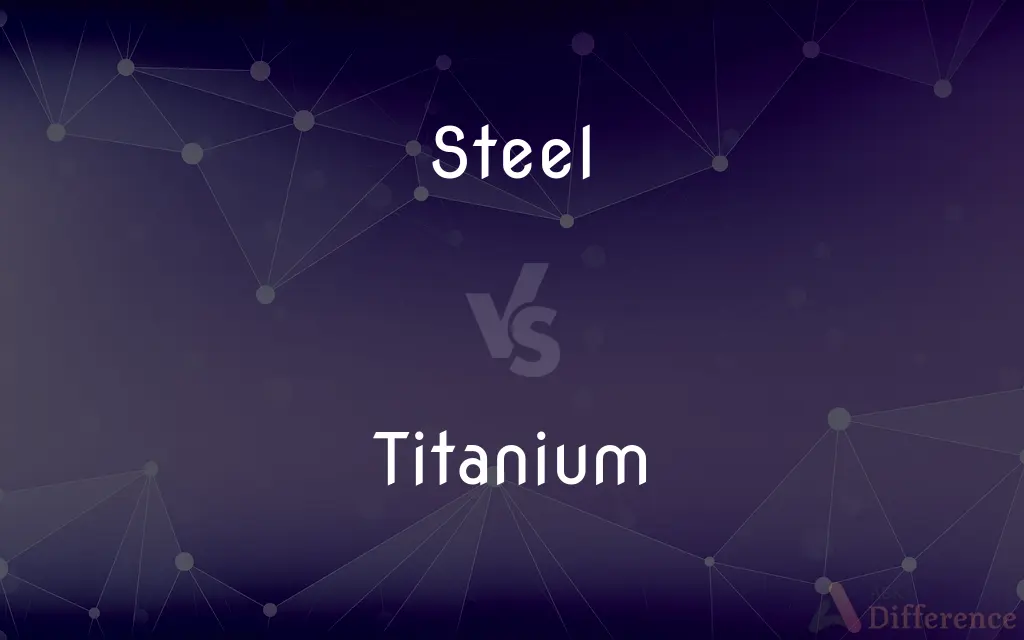Steel vs. Titanium — What's the Difference?
Edited by Tayyaba Rehman — By Fiza Rafique — Updated on September 29, 2023
Steel is an alloy primarily composed of iron and carbon, while titanium is a strong, lightweight, silver-colored element.

Difference Between Steel and Titanium
Table of Contents
ADVERTISEMENT
Key Differences
Steel and Titanium are both metals used widely in industries, but they have distinct properties. Steel is an alloy, mainly made up of iron with varying amounts of carbon and other elements. In contrast, Titanium is a chemical element with the symbol Ti, known for its high strength-to-weight ratio.
In terms of strength, Steel typically has higher tensile strength than Titanium. However, when considering strength-to-weight ratio, Titanium often outperforms steel, making it ideal for applications where both strength and lightness are required.
Corrosion resistance is a notable property of Titanium, which gives it an advantage over Steel in many environments, especially those that are saline or chlorinated. While stainless Steel offers corrosion resistance, Titanium is generally more resistant to corrosion by seawater.
When it comes to cost, Steel usually is more cost-effective and widely available compared to Titanium. This makes Steel more common in everyday applications. Titanium, due to its specialized properties and processing difficulty, typically commands a higher price.
In the realm of biocompatibility, Titanium shines. While both Steel and Titanium can be used for medical implants, Titanium is often preferred due to its resistance to corrosion in the body and its ability to osseointegrate, or bond, with bone.
ADVERTISEMENT
Comparison Chart
Composition
Alloy (primarily iron and carbon)
Chemical element (symbol Ti)
Strength-to-weight
Lower than titanium
High strength-to-weight ratio
Corrosion Resistance
Varies (stainless steel is corrosion-resistant)
Highly resistant, especially to seawater
Cost
Generally less expensive
More expensive due to processing difficulty
Biocompatibility
Used in medical devices
Preferred for implants due to superior biocompatibility
Compare with Definitions
Steel
Can be alloyed with other elements for desired properties.
Stainless Steel contains chromium for corrosion resistance.
Titanium
Known for its high strength-to-weight ratio.
Lightweight Titanium frames are popular in high-performance bicycles.
Steel
Subject to rust if not treated or alloyed properly.
Steel tools need protection to prevent rusting.
Titanium
Highly resistant to corrosion, especially by seawater.
Titanium is favored for marine applications.
Steel
Steel is an alloy made up of iron with typically a few tenths of a percent of carbon to improve its strength and fracture resistance compared to iron. Many other elements may be present or added.
Titanium
A strong, lightweight, silver-colored metal.
Titanium is used in aircraft engines because of its heat resistance.
Steel
A hard, strong grey or bluish-grey alloy of iron with carbon and usually other elements, used as a structural and fabricating material
Steel girders
Titanium
Often used in medical implants due to biocompatibility.
Hip replacements often use Titanium because it bonds with bone.
Steel
Mentally prepare (oneself) to do or face something difficult
His team were steeling themselves for disappointment
She steeled herself to remain calm
Titanium
Titanium is a chemical element with the symbol Ti and atomic number 22. Its atomic weight is 47.867 measured in daltons.
Steel
A generally hard, strong, durable, malleable alloy of iron and carbon, usually containing between 0.2 and 1.5 percent carbon, often with other constituents such as manganese, chromium, nickel, molybdenum, copper, tungsten, cobalt, or silicon, depending on the desired alloy properties, and widely used as a structural material.
Titanium
A strong, low-density, highly corrosion-resistant, lustrous white metallic element that occurs widely in igneous rocks and is used to alloy aircraft metals for low weight, strength, and high-temperature stability. Atomic number 22; atomic weight 47.87; melting point 1,668°C; boiling point 3,287°C; specific gravity 4.51; valence 2, 3, 4. See Periodic Table.
Steel
Something, such as a sword, that is made of steel.
Titanium
A chemical element, atomic number 22; it is a strong, corrosion-resistant transition metal, used to make light alloys for aircraft etc.
Steel
A quality suggestive of this alloy, especially a hard, unflinching character.
Titanium
(countable) A single atom of this element.
Steel
Steel gray.
Titanium
An elementary substance found combined in the minerals manaccanite, rutile, sphene, etc., and isolated as an infusible iron-gray amorphous powder, having a metallic luster. It burns when heated in the air. Symbol Ti. Atomic weight 48.1.
Steel
Made with, relating to, or consisting of steel
Steel beams.
The steel industry.
A bicycle with a steel frame.
Titanium
A light strong gray lustrous corrosion-resistant metallic element used in strong light-weight alloys (as for airplane parts); the main sources are rutile and ilmenite
Steel
Very firm or strong
A steel grip.
Titanium
It's the ninth-most abundant element in the Earth's crust.
Due to its abundance, Titanium has potential for more widespread use.
Steel
Of a steel gray.
Steel
To cover, plate, edge, or point with steel.
Steel
To make hard, strong, or obdurate; strengthen
He steeled himself for disappointment.
Steel
An artificial metal produced from iron, harder and more elastic than elemental iron; used figuratively as a symbol of hardness.
Steel
(countable) Any item made of this metal, particularly including:
Steel
Bladed or pointed weapons, as swords, javelins, daggers.
Steel
A piece used for striking sparks from flint.
Steel
Armor.
Steel
A honing steel, a tool used to sharpen or hone metal blades.
Steel
(sewing) Pieces used to strengthen, support, or expand an item of clothing.
Steel
(dialectal) A flat iron.
Steel
A sewing needle; a knitting needle; a sharp metal stylus.
Steel
(printing) An engraving plate:
Steel
Projectiles.
Steel
(sewing) A fringe of beads or decoration of this metal.
Steel
A type of slide used while playing the steel guitar.
Steel
Medicinal consumption of this metal; chalybeate medicine; (eventually) any iron or iron-treated water consumed as a medical treatment.
Steel
(countable) Varieties of this metal.
Steel
The gray hue of this metal; steel-gray, or steel blue.
Steel
(figurative) Extreme hardness or resilience.
Steel
Made of steel.
Steel
Similar to steel in color, strength, or the like; steely.
Steel
(business) Of or belonging to the manufacture or trade in steel.
Steel
Containing steel.
Steel
(printing) Engraved on steel.
Steel
(transitive) To edge, cover, or point with steel.
Steel
(transitive) To harden or strengthen; to nerve or make obdurate; to fortify against.
Steel
To back with steel.
Steel
To treat a liquid with steel for medicinal purposes.
Steel
To press with a flat iron.
Steel
To cause to resemble steel in appearance.
Steel
(transitive) To steelify; to turn iron into steel.
Steel
(transitive) To electroplate an item, particularly an engraving plate, with a layer of iron.
Steel
(transitive) To sharpen with a honing steel.
Steel
Coldbath Fields Prison in London, closed in 1877.
Steel
A variety of iron intermediate in composition and properties between wrought iron and cast iron (containing between one half of one per cent and one and a half per cent of carbon), and consisting of an alloy of iron with an iron carbide. Steel, unlike wrought iron, can be tempered, and retains magnetism. Its malleability decreases, and fusibility increases, with an increase in carbon.
Steel
An instrument or implement made of steel
Steel
A weapon, as a sword, dagger, etc.
While doubting thus he stood,Received the steel bathed in his brother's blood.
Steel
Fig.: Anything of extreme hardness; that which is characterized by sternness or rigor.
Steel
An instrument of steel (usually a round rod) for sharpening knives.
Steel
A chalybeate medicine.
Steel
A piece of steel for striking sparks from flint.
Steel
To overlay, point, or edge with steel; as, to steel a razor; to steel an ax.
Steel
To make hard or strong; hence, to make insensible or obdurate.
Lies well steeled with weighty arguments.
O God of battles! steel my soldiers' hearts.
Why will you fight against so sweet a passion,And steel your heart to such a world of charms?
Steel
To cause to resemble steel, as in smoothness, polish, or other qualities.
These waters, steeledBy breezeless air to smoothest polish.
Steel
To cover, as an electrotype plate, with a thin layer of iron by electrolysis. The iron thus deposited is very hard, like steel.
Steel
An alloy of iron with small amounts of carbon; widely used in construction; mechanical properties can be varied over a wide range
Steel
A cutting or thrusting weapon with a long blade
Steel
Knife sharpener consisting of a ridged steel rod
Steel
Get ready for something difficult or unpleasant
Steel
Cover, plate, or edge with steel
Steel
An alloy mainly composed of iron and carbon.
Skyscrapers are often made of Steel due to its strength.
Steel
Known for its tensile strength and durability.
Steel cables support suspension bridges.
Steel
Widely used in construction and manufacturing.
Cars often have Steel frames for structural integrity.
Common Curiosities
Does Steel corrode in seawater?
Yes, Steel can corrode in seawater, though stainless steel has better resistance.
Why is Titanium used in aerospace?
Titanium is used in aerospace due to its high strength-to-weight ratio and heat resistance.
What is the primary component of Steel?
Steel is primarily composed of iron, alloyed with carbon.
Which is heavier, Steel or Titanium?
Steel is denser and generally heavier than Titanium.
Is Titanium a good conductor of electricity?
Titanium is a poorer conductor of electricity compared to metals like copper or Steel.
Is Titanium an alloy?
No, Titanium is a chemical element with the symbol Ti.
Why is Titanium preferred for medical implants?
Titanium is biocompatible, resists corrosion in the body, and can bond with bone.
Can Steel be magnetized?
Yes, many types of Steel can be magnetized.
Why is Titanium expensive?
Titanium processing is complex and energy-intensive, contributing to its higher cost.
Are there different grades of Steel?
Yes, there are various grades of Steel based on composition and properties.
Share Your Discovery

Previous Comparison
Aboard vs. Board
Next Comparison
Mettle vs. NettleAuthor Spotlight
Written by
Fiza RafiqueFiza Rafique is a skilled content writer at AskDifference.com, where she meticulously refines and enhances written pieces. Drawing from her vast editorial expertise, Fiza ensures clarity, accuracy, and precision in every article. Passionate about language, she continually seeks to elevate the quality of content for readers worldwide.
Edited by
Tayyaba RehmanTayyaba Rehman is a distinguished writer, currently serving as a primary contributor to askdifference.com. As a researcher in semantics and etymology, Tayyaba's passion for the complexity of languages and their distinctions has found a perfect home on the platform. Tayyaba delves into the intricacies of language, distinguishing between commonly confused words and phrases, thereby providing clarity for readers worldwide.














































